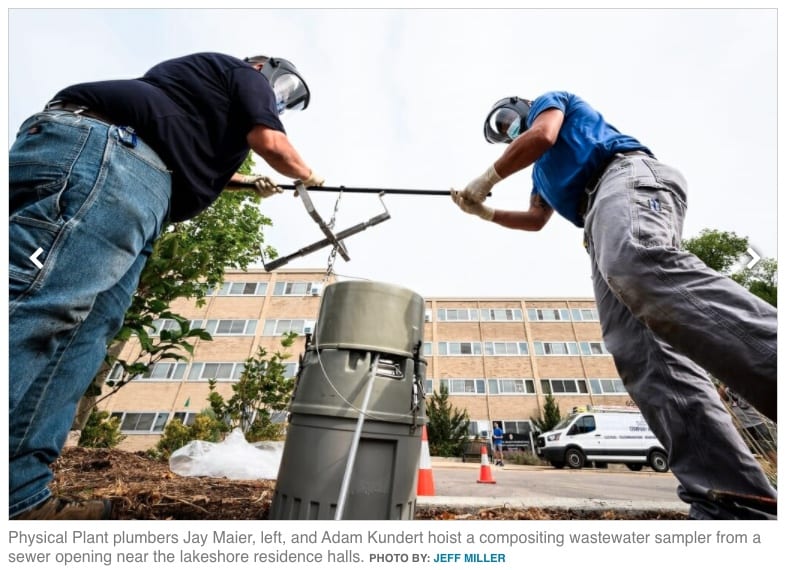08 Sep Everybody poops, some shed the virus that causes COVID-19. Wisconsin’s wastewater surveillance is looking for it.
It’s like searching for a needle in a haystack. Except the haystack is human excrement. The needle, a tiny fragment of the tiny genetic material of a tiny virus that has, since December 2019, had a massive impact on the world.
 Scientists at the Wisconsin State Laboratory of Hygiene, with collaborators at the University of Wisconsin-Milwaukee School of Freshwater Sciences, are sifting through raw sewage collected once or twice per week from nearly 100 wastewater treatment facilities statewide, and at the University of Wisconsin–Madison, in search of the genetic fingerprint of the virus that causes COVID-19, SARS-CoV-2.
Scientists at the Wisconsin State Laboratory of Hygiene, with collaborators at the University of Wisconsin-Milwaukee School of Freshwater Sciences, are sifting through raw sewage collected once or twice per week from nearly 100 wastewater treatment facilities statewide, and at the University of Wisconsin–Madison, in search of the genetic fingerprint of the virus that causes COVID-19, SARS-CoV-2.
Detecting and measuring how much virus there is may provide an early warning signal that cases of COVID-19 may soon rise and provide a readout of how levels of virus change in a population over time. It could give hospitals time to prepare for an increase in patients.
At UW–Madison, wastewater surveillance also provides an opportunity to target campus testing (UW–Madison is offering no-cost testing for all students and employees), isolation and quarantine, and limit disease spread.
This is especially important since the virus can transmit from person-to-person before symptoms begin, and some people with the virus never develop symptoms at all.
“We picked this up in late March and said this is really something we should be doing,” says Martin Shafer, a scientist at the WSLH and the UW–Madison College of Engineering. “We put a proposal into the (Wisconsin) Department of Health Services, and it was funded … It’s the largest in terms of the number of wastewater facilities in the country.”
That funding, a collaboration between WSLH, UW–Milwaukee, DHS and the Wisconsin Department of Natural Resources, amounts to $1.25 million. The WSLH group, which includes scientists Jocelyn Hemming, Dagmara Antkiewicz and Kayley Janssen, also received a boost thanks to $10,000 in UW/WARF COVID-19 Accelerator Challenge funding to improve wastewater surveillance methods for SARS-CoV-2.



